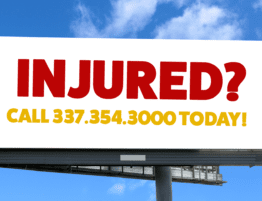
- Adjusters are paid to save money and to pay you the least amount legally possible for your claim. You must remember that they don’t have your best interests at heart when they process a claim, as your best interests will result in a much higher payout on their part.
- Do not let an adjusters convince you to settle quickly or before hiring an attorney. If you accept, there’s a chance that you could be liable for future expenses that weren’t covered by your payout.
- You are under no obligation to sign away your privacy rights to an adjuster unless a court orders otherwise.
- Do not comply with their request to make any official recorded statements without the presence of your attorney. They may try to attempt to use your words against you.
- You always have the choice of the repair shop you wish to do business with. Reputable shops will usually guarantee the repairs for the life of the vehicle, and the insurance company has nothing to do with that.
If you’re involved in a car accident, you need to be aware of what you should or shouldn’t say or do in order to protect yourself and your case. There are certain warning signs and red flags that may come up when speaking to an insurance adjuster or the other party’s representation, so it’s best to speak with an experienced attorney who will be on your side and who will guide you through this difficult process.
Take a look below, where we’ve outlined some of the most common phrases that should raise red flags during this complicated situation.
“Hello, I am the insurance adjuster investigating your accident claim, and I am here to help settle this matter for you as soon as possible.”
If you have a personal injury and damage claim against another driver’s insurance company due to their negligence, an insurance adjuster will be assigned to handle the claim. Because their insured is responsible for these damages, their main objective is to pay out as little as possible—or maybe even deny the claim outright by denying liability. It’s possible that they try to convince you the value of your claim is worth less than it actually is. If they are “investigating,” then the insurance company plans to not offer you the full value of your damages.
Adjusters are paid to save money and to pay you the least amount legally possible for your claim. You must remember that they work for the insurance company of the negligent driver that caused your damages. They don’t have your best interests at heart when they process a claim, as your best interests will result in a much higher payout on their part.
They are trained to protect their employer’s bottom line as much as possible, and this, unfortunately, can come at the expense of vulnerable accident victims. Their business stays afloat by diminishing the value of insurance claims against their insured.
That is why it is so important to get legal representation from an attorney as soon as possible before speaking to an adjuster—or anyone else—so that you have someone on your side, too!
“You don’t really need to hire an attorney and lose a third of your claim payment.”
Most adjusters know that if they can convince you to settle quickly before hiring an attorney, you are much more likely to take a lower payment. If you accept, there’s a chance that you could even be liable for future excess medical and automobile repair expenses that weren’t covered by their payment.
Accident victims who are represented by a lawyer typically end up with a higher settlement than those that attempt to go it alone.
“You are required to sign this authorization form to obtain your medical records so we can know how much to pay you for your injuries.”
You are under no obligation to sign away your privacy rights to an adjuster unless a court orders otherwise. You shouldn’t allow the adjuster to obtain your confidential medical records because they may search through them for any pre-existing health condition or injury they can find. Then, they can blame your current injury on the pre-existing condition to try to get out of liability.
You and your attorney should go through your medical records and only give the adjuster records that prove your injury claim. Never voluntarily sign anything or provide information to the adjuster on your own accord. Your attorney will handle all the details.
“I wanted to ask you a few questions about the accident and I need to record your statements so I can fill out the required paperwork later.”
This is another clue and huge red flag that the adjuster is trying to either get out of paying the claim or, at the very least, severely diminish its value.
If you comply with their request to make statements, there may be something they attempt to use against you and make it difficult for an attorney to get a fair settlement for you in the future.
Decline their offer because it will not help your case and any wrong words have the potential to harm your settlement. Make sure to hire an attorney as soon as possible to protect you from these common practices.
“Select one of our preferred repair shops or we will not be able to guarantee your car’s repairs or prevent delays that may happen.”
Many adjusters make you feel like you don’t have a choice of repair shops besides the one that’s on their “preferred” list.
This can be intimidating because the adjuster may make you feel that the repairs won’t happen quickly—or without delays—unless you comply.
Remember, you always have the choice of the repair shop you wish to do business with. Reputable shops will usually guarantee the repairs for the life of the vehicle, and the insurance company has nothing to do with that.
The insurance company must still pay to put your car back in its pre-accident condition and cover further loss of value—no matter what repair shop you use.
The Law Office of Stephen C. Gaubert has a wealth of experience dealing with insurance adjusters and protecting the rights of car accident victims. If you’ve been involved in an accident, don’t get shortchanged by trying to navigate the situation alone. Call us at (337) 354-3000 to find out how we can help.










